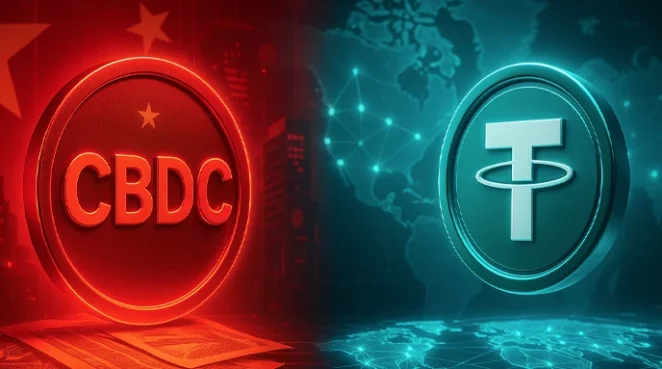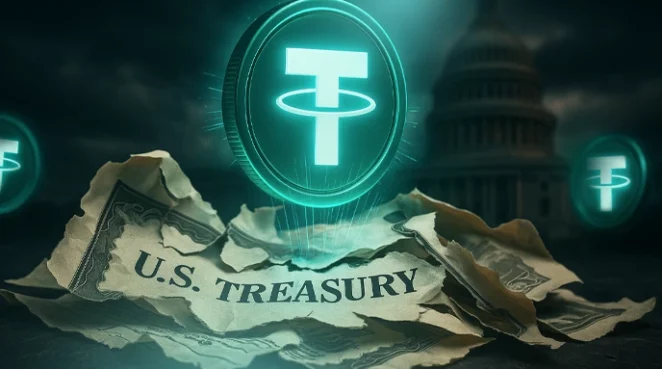Nobody Trusts Treasuries—So Tether Stepped In
Something strange is happening in global finance—and no, it’s not just gold mooning again.
Governments and institutions don’t want U.S. Treasuries anymore. China is offloading them. Japan’s appetite is waning. Even the Fed is stuck buying its own debt. The result? That capital has to go somewhere. A lot of it is flowing into gold. But gold can’t buy you groceries—or send money to your family overseas.
That’s where stablecoins come in.
Specifically, Tether (USDT) has emerged as the dominant force in global dollar-denominated transactions. And it’s not just crypto bros swapping tokens on exchanges. It’s ordinary people—merchants, freelancers, migrants—using stablecoins as functional dollars. In Nigeria. In Turkey. In Argentina. In Ukraine. Everywhere the dollar is needed but banks are broken.
USDT is succeeding where banks and Western institutions have failed: delivering dollar liquidity quickly, cheaply, and without gatekeepers.
SWIFT Is Dying—And Stablecoins Are the Reason
For decades, the global financial system ran on the SWIFT rails. Slow, expensive, and layered with middlemen clipping fees. Even today, legacy banks like Barclays happily take a cut—just for routing money between two other banks.
That grift is on its way out.
Stablecoins don’t need permission. They don’t need intermediaries. And they’re scaling at a pace that makes SWIFT look like a relic from the fax machine era. While big banks may continue to handle major institutional flows, the new financial bloodstream is forming around stablecoins—and it’s increasingly peer-to-peer.
Regulatory tailwinds could accelerate this. The GENIUS Act, currently under consideration in the U.S., could grant formal recognition to certain stablecoins like USDT. That would be a game-changer. If approved, Tether could become a major buyer of U.S. Treasuries, stepping in where foreign governments are pulling out.
That’s not just a backdoor bailout. It’s the formation of a parallel financial system.
A Fractured Dollar Future

Here’s where we need to look at the geopolitical angle.
As the U.S. increasingly weaponizes the dollar through sanctions and trade restrictions, countries that refuse to toe Washington’s line are being forced to rethink their dependence. But replacing the dollar isn’t easy—especially when your own currency is collapsing and your people still want stability.
What we might see emerge is a bifurcated dollar system:
- A “free” domestic dollar, used within the U.S. and allied economies.
- A premium-priced trade dollar, used by countries unwilling to adopt U.S. terms but still dependent on dollar liquidity.
Gold-backed currencies may sound appealing in this context, but they’re hard to move, impossible to spend, and terrible for anything beyond long-term settlement. You can’t Venmo someone gold.
Stablecoins, meanwhile, solve this perfectly.
They retain dollar utility without the friction of the banking system, they let people store value without exposure to local currency collapse, and they move at the speed of the internet
Goodbye Borders, Hello Digital Value Transfer

Here are the broader implications...
Stablecoins won’t just be used to send money. They’ll become a core store of value for people in volatile economies—a substitute for both gold and fiat. As compliance frameworks mature and liquidity deepens, we’ll see a new kind of ecosystem form:
We’re not there yet. But the trajectory is clear.
When the world loses faith in Treasuries and turns to gold, that’s a macro signal. But when it turns to Tether, that’s a paradigm shift.
And it’s already happening.
Join The Leading Crypto Channel
JOINDisclaimer:Please note that nothing on this website constitutes financial advice. Whilst every effort has been made to ensure that the information provided on this website is accurate, individuals must not rely on this information to make a financial or investment decision. Before making any decision, we strongly recommend you consult a qualified professional who should take into account your specific investment objectives, financial situation and individual needs.

cristian
Cristian is the CEO and Co-Founder of Liquid Loans. A former partner in an international accounting firm, Cristian brings this wealth of experience to build and provide thought leadership in the blockchain and DeFi space.

Development
Knowledge
Subscribe To Newsletter
Stay up-to-date with all the latest news about
Liquid Loans, Fetch Oracle and more.
Copyright © 2024 Crave Management.
All Rights Reserved.

The LL Librarian
Your Genius Liquid Loans Knowledge Assistant




